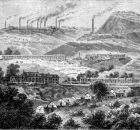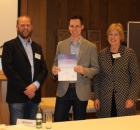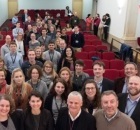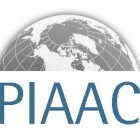
 |
| Issue 2/2017 |
Recent Research Topics |
Apprenticeship, Master Craftsman, University: Education Pays off!Education is an investment: it costs time, effort, and money. But the costs pay off. The bottom line is that in Germany, each higher level of qualification yields between 22 and 64 percent higher income over the entire working life. This is the result of a recent study conducted by the ifo Center for the Economics of Education on behalf of Union Investment. Over their entire career, individuals with an apprenticeship degree earn 143,000 Euro more than those without a professional degree. A Master craftsmanship yields 129,000 Euro more than an apprenticeship, a degree from a University of Applied Sciences 267,000 Euro, and a university degree 387,000 Euro. But there are large differences by field of study both for apprenticeship and university degrees – for instance between medical studies and social work. more (in German)... |

|
How Luther’s Education Boost Changed the Course of HistoryOn the occasion of the 500th anniversary of the Reformation, many diverse theses have been put forward about how Luther changed the course of the world and influenced today’s Germany. A crucial aspect, however, is the fact that the Reformation caused an education boost in the population – with far-reaching consequences for the course of (economic) history, until today. This has been shown by a comprehensive research program at the ifo Center for the Economics of Education summarized by Ludger Woessmann in a recent article for the Wirtschaftswoche The better education of the Protestant population is more likely to be responsible for the Protestants’ economic advantage than a specific Protestant work ethic as propagated by Max Weber. more (in German)... |

|
Coping with Economic ChangeSkills are important to be able to cope with economic change. This is the finding of a study by Simon Wiederhold and Ludger Woessmann from the ifo Center for the Economics of Education together with ifo Research Professors Eric Hanushek (Stanford) und Guido Schwerdt (Konstanz) that was just published in Economics Letters. Using data for 32 countries in the so-called “Adult PISA,” they show that labor-market returns to skills are systematically larger in countries that have grown rapidly. more... |

|
Graduates of Technical Colleges and Universities ComparedIn a study for the German Commission of Experts for Research and Innovation, Anita Fichtl from the ifo Center for Labor and Demographic Economics and Marc Piopiunik from the ifo Center for the Economics of Education compare graduates from technical colleges (Universities of Applied Sciences) with university graduates in comparable fields of study and professions in Germany. The graduates hardly differ with respect to their occupational research and development activities. However, university graduates on average show higher cognitive skills and attain higher earnings than graduates from technical colleges. Moreover, they are more likely to have an academic family background. more (in German)... |

|
Regional Conditions Important for the Impact of Migration on CrimeIn a study prepared at the ifo Center for the Economics of Education and recently published in the European Economic Review, Marc Piopiunik and Jens Ruhose examine whether the inflow of ethnic German immigrants from the former Soviet Union after the Fall of the Wall had an impact on crime rates in West German counties. The analysis of administrative data from Police Criminal Statistics shows a significant increase in crime only in regions with bad labor-market conditions and with high preexisting crime levels, as well as in metropolitan areas. Thus, regional conditions seem to be relevant for the successful integration of migrants. more... |

|
New Hypothesis on the Historical Roots of the End of SerfdomThe growing significance of skilled labor for yielding high returns to physical capital during the industrialization induced societal elites to relinquish the historically profitable coercion of labor in favor of employing free skilled workers. This is what Francesco Cinnirella from the ifo Center for the Economics of Education argues in a recent working paper together with Quamrul Ashraf (Williams College), Oded Galor (Brown University), Boris Gershman (American University), and Erik Hornung (University of Bayreuth). Thereby, the masses were incentivized to engage in broad-based human capital acquisition without having to fear to lose their skill premium to expropriation. Evidence from 19th-century Prussia corroborates this new hypothesis. more... |

|
| Back to top | |
A European Perspective: EENEE | |
|
The
European Expert Network on the Economics of Education (EENEE), coordinated by the ifo Center for the Economics of Education on behalf of the European Commission`s Directorate-General for Education an Culture, published two new EENEE Analytical Reports on policy-relevant topics in the economics of education:
Mette Trier Damgaard and Helena Skyt Nielsen: The Use of Nudges and other Behavioral Approaches in Education, EENEE Analytical Report 29 Holger Bonin: The Potential Economic Benefits of Education of Migrants in the EU, EENEE Analytical Report 31 |

|
| Back to top | |
In the English News |
Turning qualifications into jobsThe Economist covers a study by the ifo Center for the Economics of Education which shows that vocational education facilitates the school-to-work transition but reduces later adaptability to changing environments. more... |
How Martin Luther Invented Modern EducationHandelsblatt Global reports on the research by Sascha Becker and Ludger Woessmann on the human capital theory of Protestant economic history. more... |
In the German News (Selected) |
College and Apprenticeship: Education Pays off – but in which Field?Bild online covers the recent education study of the ifo Center for the Economics of Education in a series of contributions. The study is also covered by Spiegel online, Zeit online, and several other online media. |
Education Pays OffThe large German dailies also report on the study: Frankfurter Allgemeine Zeitung: “Half a million additional income with university degree“; Süddeutsche Zeitung: “Cramming pays off“; Die Welt: “University degree pays off – if it is the right one.“ |
Apprenticeship Yields 150 000 Euro per Working LifeThe main German tabloid Bild also reports on the returns to education. more (in German)... |
Education EnrichesThe Sunday paper Frankfurter Allgemeine Sonntagszeitung reports extensively on a two-pager that studying pays off. more (in German)... |
When the Track Leads to a Dead EndContribution by Ludger Woessmann in the Frankfurter Allgemeinen Zeitung on the dual system of vocational education. more (in German)... |
When Apprenticeship Positions Remain VacantLudger Woessmann in a radio contribution in HR 2 Kultur on the importance of vocational education over the life course. more (in German)... |
World of Labor 4.0: Heyday of New QualificationsThe Süddeutsche Zeitung quotes Ludger Woessmann on the necessity of general education for the world of labor 4.0. more (in German)... |
Top Economist on IntegrationIn the interview series “The Professors” on manager-magazin.de, Ludger Woessmann talks on the educational level of refugees and new ways in apprenticeship training. more (in German)... |
Do Catholics Like Work Less?The Swiss Tagesanzeiger reports on the research by Sascha Becker and Ludger Woessmann on the importance of reading the bible for the economic success of Protestants. more (in German)... |
| Back to top |
Selected Events | |
Committee on the Economics of Education Awards Dissertation PrizeOn 2-3 March 2017, the Committee on the Economics of Education of the German Economic Association (Verein für Socialpolitik) met for its annual meeting on “Education and Prosperity” at the Leibniz University Hannover, for the last time organized by Ludger Woessmann as the chairman. During the meeting, the Prize for the Best Dissertation in the Economics of Education 2015/16 was awarded to Jan Bietenbeck from Lund University in Sweden. more (in German)... |

| Keynote Lectures on the Knowledge Capital of NationsLudger Woessmann gave keynote lectures on the Knowledge Capital of Nations at the annual meeting of the German Association for Empirical Educational Research in Heidelberg and at the Fourth Lisbon Research Workshop on Economics, Statistics and Econometrics of Education. |

|
Selected PresentationsLudger Woessmann presented his work in the Applied Microeconomics Seminar at Columbia University in New York and in the Education Seminar Series of the Federal Reserve Bank of New York and New York University, among others. No less than four researchers of the ifo Center for the Economics of Education presented their work at the International PIAAC Conference in Mannheim. |

|
| Back to top | |
Recent Publications |
Articles in Refereed JournalsEric A. Hanushek, Guido Schwerdt, Simon Wiederhold and Ludger Woessmann, “Coping with Change: International Differences in the Returns to Skills“, Economics Letters 153: 15-19, 2017.Marc Piopiunik and Jens Ruhose, “Immigration, Regional Conditions, and Crime: Evidence from an Allocation Policy in Germany“, European Economic Review 92: 258-282, 2017. |
Further ArticlesAnita Fichtl and Marc Piopiunik, „Absolventen von Fachhochschulen und Universitäten im Vergleich: FuE-Tätigkeiten, Arbeitsmarktergebnisse, Kompetenzen und Mobilität“, Studien zum deutschen Innovationssystem 14, Expertenkommission Forschung und Innovation (EFI), Berlin, 2017.Franziska Hampf and Ludger Woessmann, „Berufliche Bildung breiter ausrichten“, Die berufsbildende Schule 69 (1): 38-39, 2017. Marc Piopiunik, Franziska Kugler and Ludger Woessmann, “Income from Educational Attainment throughout Life: Current Calculations for Germany“, ifo Schnelldienst, 70 (7): 19-30, 2017. Union Investment, Bildung hat Zukunft: Bildungsstudie 2017, Frankfurt, 2017. Ludger Woessmann, „Das Wissenskapital der Nationen: Gute Bildung als Wachstumsmotor“, Wirtschaftsdienst 97, special issue: 38-42, 2017. |
Working PapersQuamrul H. Ashraf, Francesco Cinnirella, Oded Galor, Boris Gershman and Erik Hornung, “Capital-Skill Complementarity and the Emergence of Labor Emancipation“, CESifo Working Paper 6423, March 2017. |
| Back to top |
Personnel | ||
|
In April, Larissa Zierow joined the ifo Center for the Economics of Education as a postdoc. |
||
| Back to top | ||
Imprint | |
|
The Newsletter of the Ifo Center for the Economics of Education is a free e-mail service which informs about new research results, publications, events, and more from the Ifo Center for the Economics of Education. You can download previous issues of the newsletter in the archive.
Subscribe
| Unsubscribe
| Feedback
| Twitter Your data will be stored internally by CESifo Group for dispatch of the Newsletter of the Ifo Center for the Economics of Education. It will be treated confidentially and will not be handed on to third parties. For more information see Privacy Policy. You can also visit the website of the Ifo Center for the Economics of Education. Or send us an e-mail at bildungsnews@ifo.de. Copyright © Ifo Institute 2017. Status: May 2017 Editor: Ifo Center for the Economics of Education, Ifo Institute – Leibniz Institute for Economic Research at the University of Munich, Poschingerstrasse 5, 81679 Munich
| |